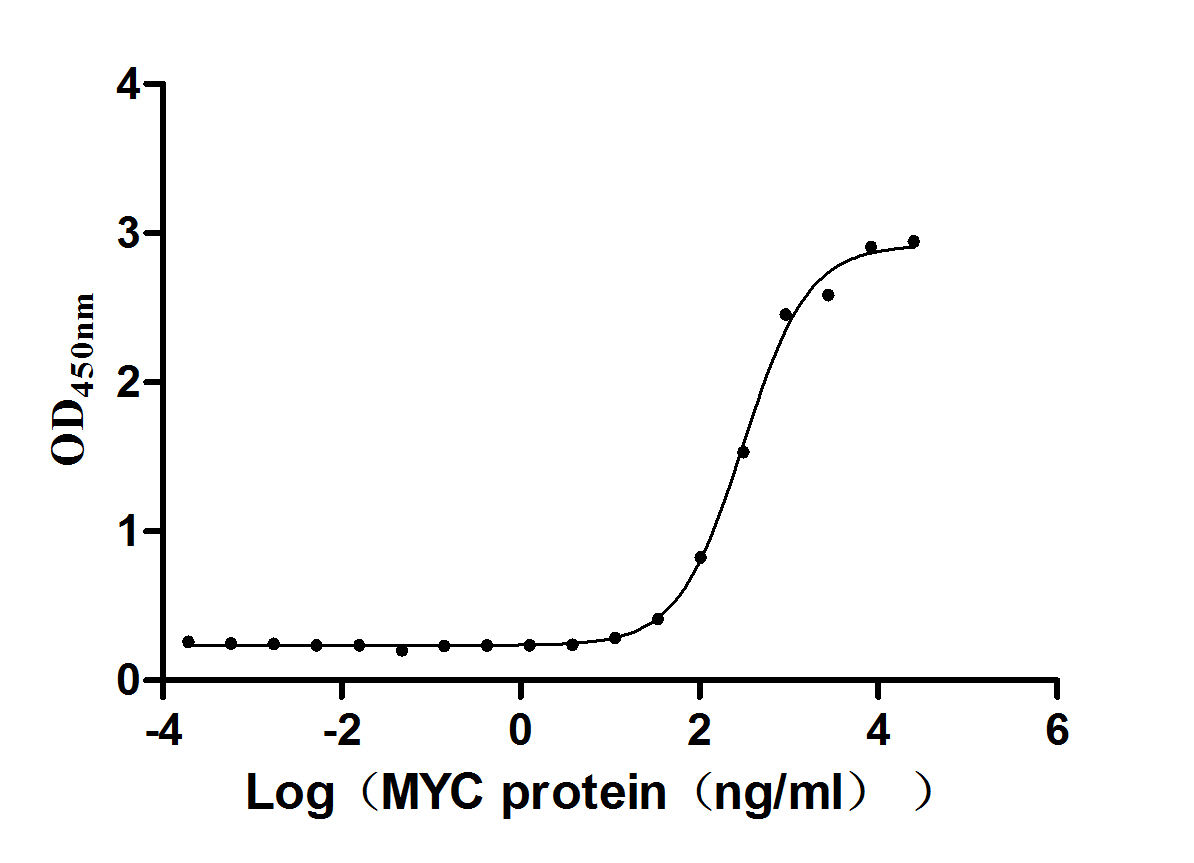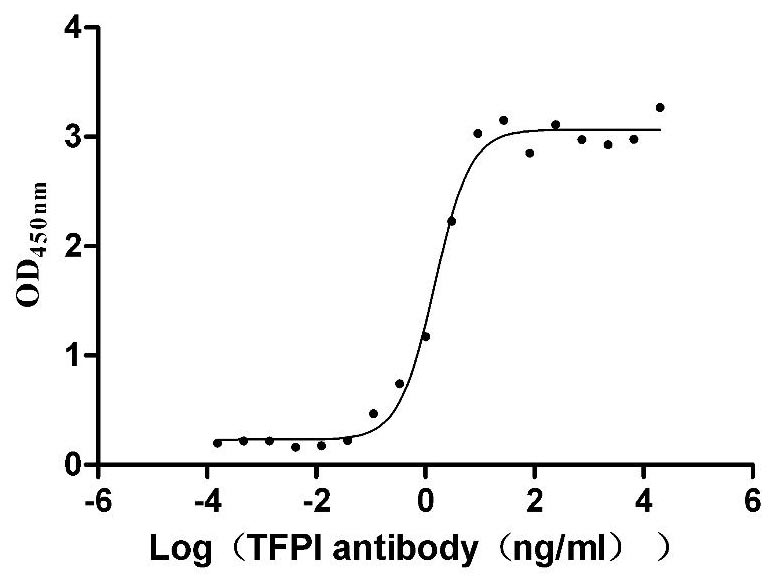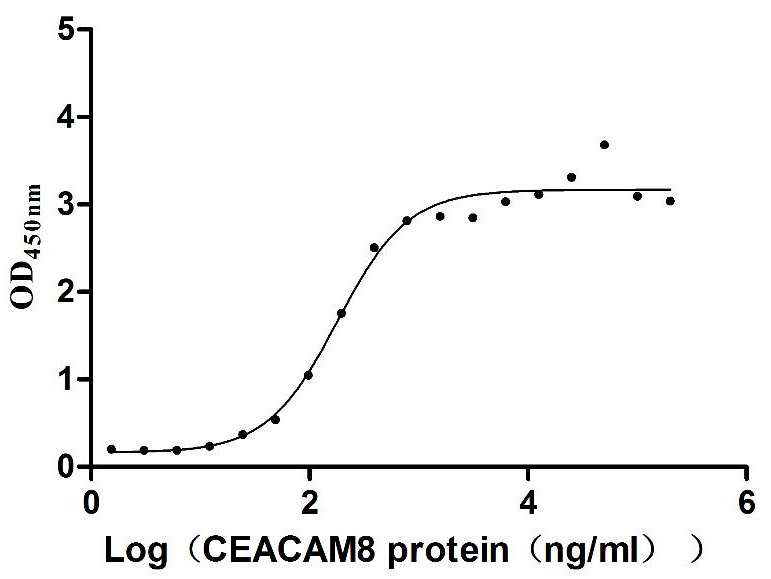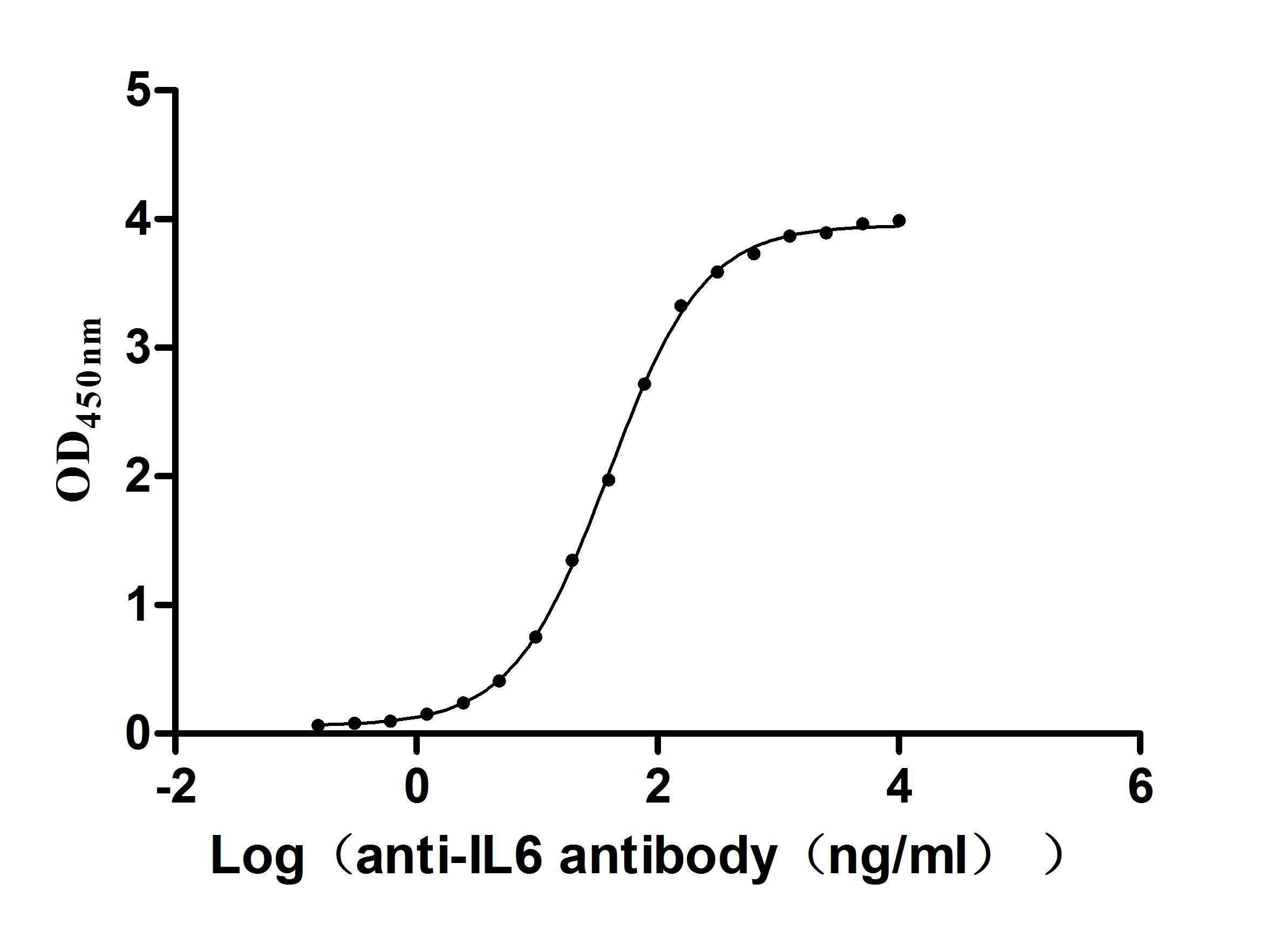Recombinant Human Adropin (ENHO)
-
货号:CSB-YP744265HU
-
规格:
-
来源:Yeast
-
其他:
-
货号:CSB-EP744265HU
-
规格:
-
来源:E.coli
-
其他:
-
货号:CSB-EP744265HU-B
-
规格:
-
来源:E.coli
-
共轭:Avi-tag Biotinylated
E. coli biotin ligase (BirA) is highly specific in covalently attaching biotin to the 15 amino acid AviTag peptide. This recombinant protein was biotinylated in vivo by AviTag-BirA technology, which method is BriA catalyzes amide linkage between the biotin and the specific lysine of the AviTag.
-
其他:
-
货号:CSB-BP744265HU
-
规格:
-
来源:Baculovirus
-
其他:
-
货号:CSB-MP744265HU
-
规格:
-
来源:Mammalian cell
-
其他:
产品详情
-
纯度:>85% (SDS-PAGE)
-
基因名:ENHO
-
Uniprot No.:
-
别名:Adropin; C9orf165; Energy homeostasis associated protein; Energy homeostasis-associated protein; ENHO; ENHO_HUMAN; PRO830; UNQ470
-
种属:Homo sapiens (Human)
-
蛋白长度:Full Length of Mature Protein
-
表达区域:34-76
-
氨基酸序列CHSRSAD VDSLSESSPN SSPGPCPEKA PPPQKPSHEG SYLLQP
-
蛋白标签:Tag type will be determined during the manufacturing process.
The tag type will be determined during production process. If you have specified tag type, please tell us and we will develop the specified tag preferentially. -
产品提供形式:Lyophilized powder
Note: We will preferentially ship the format that we have in stock, however, if you have any special requirement for the format, please remark your requirement when placing the order, we will prepare according to your demand. -
复溶:We recommend that this vial be briefly centrifuged prior to opening to bring the contents to the bottom. Please reconstitute protein in deionized sterile water to a concentration of 0.1-1.0 mg/mL.We recommend to add 5-50% of glycerol (final concentration) and aliquot for long-term storage at -20℃/-80℃. Our default final concentration of glycerol is 50%. Customers could use it as reference.
-
储存条件:Store at -20°C/-80°C upon receipt, aliquoting is necessary for mutiple use. Avoid repeated freeze-thaw cycles.
-
保质期:The shelf life is related to many factors, storage state, buffer ingredients, storage temperature and the stability of the protein itself.
Generally, the shelf life of liquid form is 6 months at -20°C/-80°C. The shelf life of lyophilized form is 12 months at -20°C/-80°C. -
货期:Delivery time may differ from different purchasing way or location, please kindly consult your local distributors for specific delivery time.Note: All of our proteins are default shipped with normal blue ice packs, if you request to ship with dry ice, please communicate with us in advance and extra fees will be charged.
-
注意事项:Repeated freezing and thawing is not recommended. Store working aliquots at 4°C for up to one week.
-
Datasheet :Please contact us to get it.
相关产品
靶点详情
-
功能:Involved in the regulation of glucose homeostasis and lipid metabolism.
-
基因功能参考文献:
- Serum adropin concentrations are decreased in Chinese T2DM patients, especially those overweight/obese. Adropin, associated with glucolipid homeostasis and insulin sensitivity, may implicate in the pathogenesis of T2DM. PMID: 29669965
- The highest adropin concentration was found in patients with P-Ch C (11.7+/-5.7 ng/ml) cirrhosis. PMID: 30260179
- Data suggest that serum and follicular fluid levels of adropin are down-regulated in women with PCOS (polycystic ovary syndrome) compared with control subjects; also, follicular fluid levels of adropin are lower than serum levels of adropin. PMID: 28937295
- significant association between maternal and umbilical adropin levels and the presence and severity of preeclampsia PMID: 28672759
- Adropin is coupled with biological clock activity. In mouse liver, ENHO expression has a diurnal rhythm that peaks at the end of maximal nutrient intake in the dark. The nuclear receptors ROR-alpha/gamma and Rev-erb may couple adropin synthesis with circadian rhythms in carbohydrate and lipid metabolism.In humans, associations between plasma adropin concentrations and LDL-C suggest a link with hepatic lipid metabolism. PMID: 29331507
- An increase in maternal serum adropin level was found in preeclampsia. PMID: 28501281
- Analysis of midluteal endometrial biopsies revealed an inverse correlation between endometrial EOGT and ENHO expression and body mass index. Obesity impairs the EOGT-adropin axis in decidual cells, which in turn points toward a mechanistic link between metabolic disorders and adverse pregnancy outcome. PMID: 29244071
- Serum adropin concentrations are negatively associated with renal function. PMID: 27546995
- High adropin expression is associated with polycystic ovary syndrome. PMID: 26969461
- There were no significant differences among the groups of systemic sclerosis (SSc) and controls in terms of ENHO gene expressions. There was no significant difference between the limited and diffuse cutaneous subtypes of SSc in terms of serum adropin level and ENHO gene expression. Moreover, serum adropin level and ENHO gene expression were not associated with the disease activity and severity indexes. PMID: 27079850
- Enho mutations plays a critical role in activating endothelial cells during neutrophil recruitment and neutrophil-endothelium cell interactions under IL-1 and TNF-alpha-induced vascular inflammation and increases susceptibility to MPOANCA associated lung injury. PMID: 27333037
- In HD patients, lower plasma adropin concentration is associated with dyslipidemia. Major homozygosity of RXRA seems to have an opposite effect on plasma adropin compared with that of ENHO rs2281997 PMID: 27449397
- Data suggest that serum adropin (ENHO) levels in normal, overweight, and obese adults negatively correlate with vascular stiffness (using common carotid artery) and adiposity (using abdominal visceral fat), and positively correlate with plasma nitric oxide levels (using nitrite/nitrate) and cardiorespiratory fitness; aerobic exercise training up-regulates serum adropin. PMID: 27897440
- The adropin levels of metabolic syndrome, obesity, and control groups also showed no difference PMID: 26226125
- Circulating adropin levels were determined lower in patients with endometrial cancer than in a control group. PMID: 26172926
- Lipids originating either from the diet or from endogenous production appear to positively affect plasma adropin concentrations in humans. PMID: 26435060
- Serum adropin levels were significantly lower in obese children; however, there was no correlation between serum adropin levels and blood pressure variables. PMID: 26030787
- Adropin as a novel energy factor likely has the ability to regulate blood pressure PMID: 25913544
- Serum adropin level was negatively correlated with carotid beta-stiffness and positively correlated with plasma NOx level and cardiorespiratory fitness PMID: 26371163
- Adropin levels are lower in patients with late saphenous vein graft occlusion and these reduced adropin levels, together with other factors, may lead to saphenous vein graft occlusion PMID: 25282140
- decreased serum adropin levels are associated with the presence of acute myocardial infarction in coronary artery disease patients PMID: 24731968
- Assessment of serum adropin concentrations may provide a reliable indicator of fatty liver disease in obese adolescents PMID: 24468600
- cord blood adropin levels were positively correlated with gestational age and placental weight but not with other fetal growth parameters. PMID: 24284417
- Plasma adropin levels were found to be a new marker for diagnosing endothelial dysfunction in type 2 diabetes mellitus. PMID: 24113736
- Release of adropin in the fed condition regulates fuel selection in skeletal muscle, promoting glucose oxidation over fat oxidation. The molecular mechanisms of adropin's effects involve acetylation (suggesting inhibition) of the transcriptional co-activator PGC1alpha, reducing PDK4 and CPT1B activity. Increased PGC1alpha acetylation by adropin may be mediated by inhibiting Sirtuin-1 (SIRT1), a PGC1alpha deacetylase. PMID: 24848071
- The mean maternal and cord serum adropin in a gestational diabetes mellitus group were significantly lower than those of control women (P=0.01 and P<0.001, respectively). PMID: 23314506
- Adropin is an independent risk factor for cardiac syndrome X (CSX). PMID: 23356444
- Although males exhibit higher adropin levels that are reduced by obesity, aging and markers of insulin resistance are associated with low plasma adropin irrespective of sex. PMID: 22872690
- Plasma adropin levels were examined in 45 men and 85 woman. Adropin levels are higher in men than woman. Obesity is associated with low adropin levels in men. Aging and metabolic risk factors are associated with low adropin levels, irrespective of sex. PMID: 22872690
- Plasma adropin levels are regulated dietary macronutrients increasing with dietary fat content. Fasting suppresses plasma adropin. Adropin's actions are required for preventing insulin resistance, dyslipidemia and impaired glucose tolerance. PMID: 22318315
- a potential endothelial protective role of adropin that is likely mediated via upregulation of endothelial NO synthase expression through the VEGFR2-phosphatidylinositol 3-kinase-Akt and VEGFR2-extracellular signal regulated kinase 1/2 pathways. PMID: 20837912
- Adropin has an endothelial protective function mediated via upregulation of eNOS expression through the VEGFR2-PI3K-Akt and VEGFR2-ERK1/2 pathways. Adropin therapy may thus be useful for limiting diseases characterized by endothelial dysfunction. PMID: 20837912
- Adropin is the name given to the secreted peptide encoded by the ORF in C9orf165. In mice, it is abundant in liver where it is regulated by dietary macronutrients. Adropin regulates expression of genes involved in lipogenesis and adipogenesis. PMID: 19041763
显示更多
收起更多
-
亚细胞定位:Secreted.
-
组织特异性:Expressed in liver and brain.
-
数据库链接:
HGNC: 24838
KEGG: hsa:375704
STRING: 9606.ENSP00000382675
UniGene: Hs.522085
Most popular with customers
-
Recombinant Human papillomavirus type 16 Protein E7 (E7) (Active)
Express system: E.coli
Species: Human papillomavirus type 16
-
Recombinant Human Tissue factor pathway inhibitor (TFPI), partial (Active)
Express system: Mammalian cell
Species: Homo sapiens (Human)
-
Recombinant Human Carcinoembryonic antigen-related cell adhesion molecule 6 (CEACAM6) (Active)
Express system: Mammalian cell
Species: Homo sapiens (Human)
-
















